THE BRUMCON PROGRAMME BOOKLETThe Brumcon Programme Book is 36 pages long (inc. covers). The majority of those pages are ads, which have not been included here. What follows is just the editorial material.
|
||
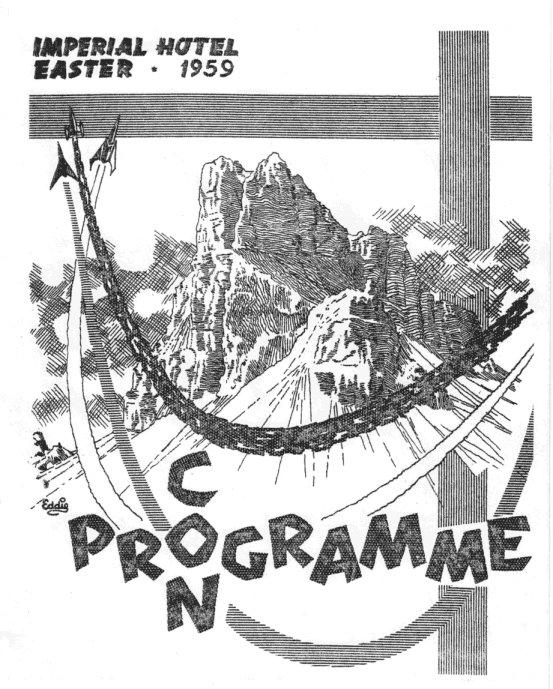
|
||
| page.1: | ||
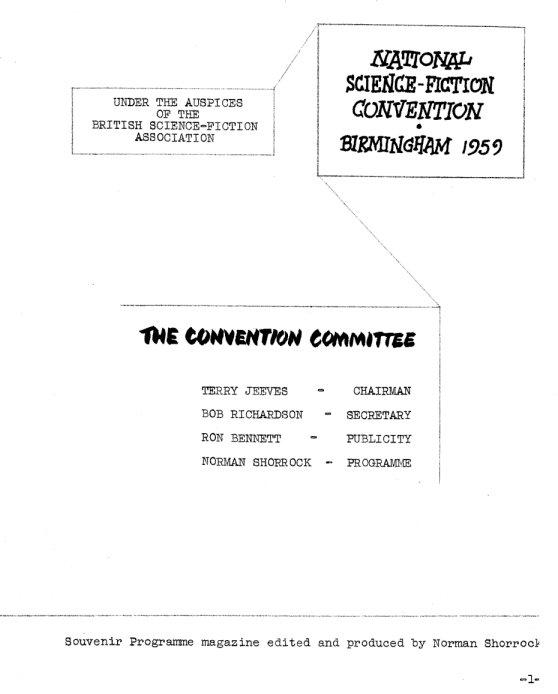
|
||
| page.2: | ||
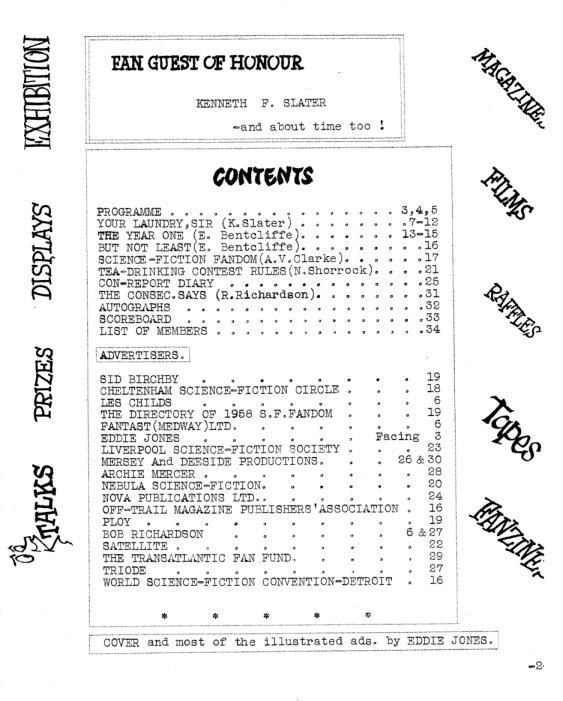
|
||
| . | ||
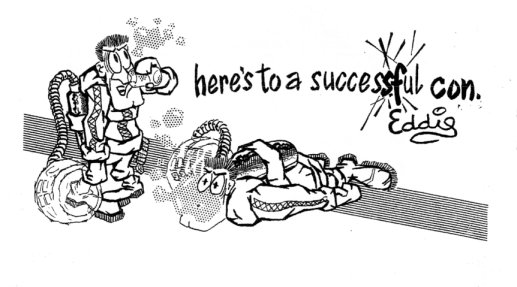
|
||
| page 3: | ||
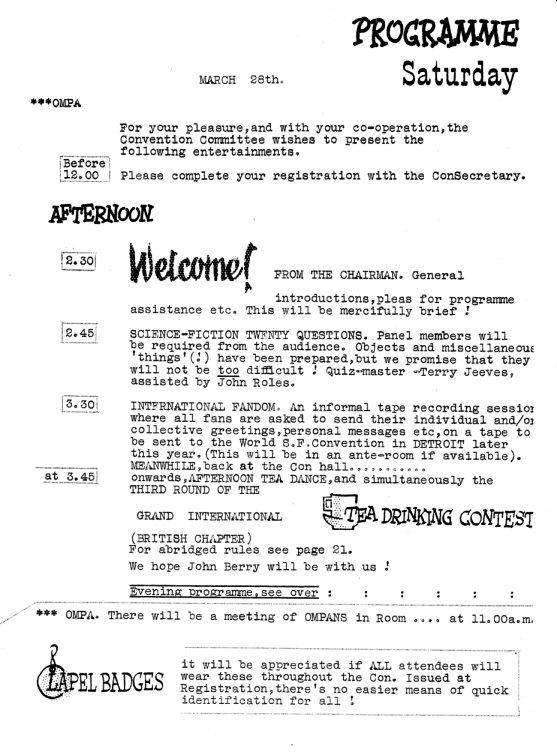
|
||
| . | ||
|
approximate only, but will be adhered to as strictly as circumstances allow. All items are subject to change, cancellation, substitution, acts of the G.D.A. and to there being insufficient audience participation where necessary!
|
||
| page 4: | ||
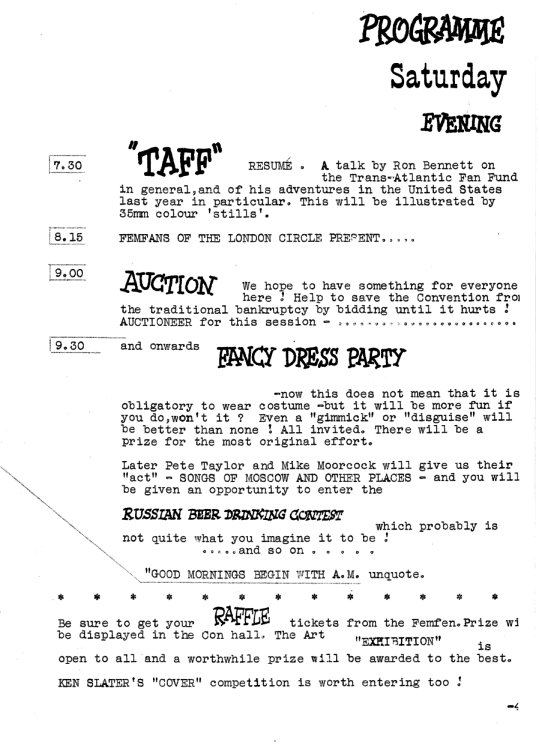
|
||
| page 5: | ||
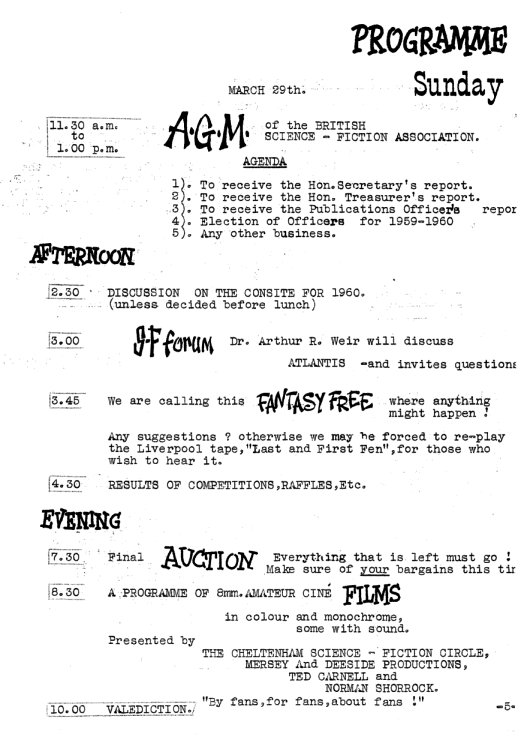
|
||
| page 7: | ||
|
YOUR LAUNDRY, SIR, by Ken F. Slater Currently, in the B.S.F.A., the sad state of health of British science fiction fandom is a topic of interest. There is a certain school of thought which considers that fandom is dying on its feet; there is another school which has concluded that fandom is already dead and the appearance of life is a sort of zombie-effect caused by a few die-hards. A third school holds the opinion that there is nothing wrong in fandom - please note that every time I write "fandom" I mean "science fiction" or "fantasy" fandom, but as I'm not being paid wordage rates (or any other rates) for this, there is no point in doubling up with those words all the time. A fourth school contends that there is something wrong with fandom, and feels that something should be done about it. I gather that it was this school of thought which brought the B.S.F.A, into existence, and from what I have read of other fanwriting on the subject it would seem that the general feeling can be boiled down to two things: a) fandom lacks new blood, it no longer, attracts new readers of s-f into the "collective individualism" for which it has been renowned, and b) it has no means of attracting new people because it has nothing to offer them. The result is that although 'good' science fiction finds a very steady reader's market, the group of enthusiasts is slowly diminishing and will in due course fade away when the last-but-one fan sits down to write the epitaph of the last-but-two fan. If I have that right, then I concur with the general opinion. I hope that at the Birmingham Convention we'll be able to exchange our ideas on how to counteract this lethargy on the part of the science- fantasy reading public. As a preamble I'll try to summarise a few of the things which have led to this position, over the last ten to fifteen years of fandom. Much of this will be debatable, some of it may give rise to some Violent reactions, all of it - or nearly all - will be generalities rather than particulars. It will, I trust, be of use in those respects; it may give some points of discussion from which worthwhile ideas may result; any violent reaction in the past has generally proved of worth to fandom in the long run (there is nothing like a crusade against someone or something for arousing interest!); generalities are things one can argue without personal offence. The picture around '45-'47 was reasonably placid; science fiction hadn't started to boom, in the trade, but both the professional and amateur fields of s-f were filled with enthusiasts. Maybe they didn't live and breathe s-f but quite a few of them were well on the way towards it. The amateur magazines were numerous, and to a large
|
||
| page 8: | ||
|
extent very good. Such things as Walt Gillings' "FANTASY REVIEW",
with its excellent reviews, news columns, and 'biographies' of
magazines, spring to mind. The British Fantasy Library was a very
definite going concern, and through it British fandom was once
more joining contact. From the States there came items like "The
GORGON" which I particularly recall for Phil Rasch's fine series
of articles on the derivation of Merritt's fantasy themes. "The
FANTASY ADVERTISER" and Bob Tucker's "BLOOMINGTON NEWS LETTER"
were going strong. The list could be extended through several
pages of foolscap, as a glance at the fanmag review columns of a
copy of "STARTTLING STORIES" for that era will show you. Whilst
1946 saw 'Sergeant Saturn' demobbed as 'editor' of the 'Popular'
s-f magazines TWS/SS, and other post-war changes in editorial
policy followed in other magazines, the letter columns did not
disappear, and remained the main source of new contacts for all
existing fans and fan-groups. But the changes in policy did have
some effect - many of the letter-hacks from TWS/SS and PLANET who
no longer found their particular ribald type of humour published
in the magazines turned their attention to fanmags, and several
excellent fanzines devoted to letters only appeared - POSTWARP
was perhaps the most notable of these, I think. I may be a bit
off in date, tho'. In the professional field sincere enthusiasts were setting up publishing houses which were to become the delight of s-f collectors, and at a later date were to surprise the regular established publishing houses. The first crop of new and revived magazines made their appearance - ill-fated in the UK, we know, with Pendulum Publications three-issue 'NEW WORLDS', the equally short-lived 'FANTASY', and the solitary issue of 'OUTLANDS'. But the enthusiast of that day was tenacious; "Ted" Carnell stuck to 'NEW WORLDS' and is the prime example of what real enthusiasm can do. The entirety of the s-f field was a fraternity, in which readers and editors, authors, and artists, shared. There was, it is true, a dividing line between the professional and the fan, but it was a line that anyone could cross either way. The period '45 to '50 was probably, the period of growth of post World War II fandom. Came 1950 and the trade "boom," in science- fiction. It is hard to put. a firm date on this, but I think 1950 is near enough - it maybe started a little earlier, but 1950 was when the boom was really underway. Now, the hardcore of this boom was the enthusiast. Oh, plenty of other people went along, blowing their own personal instrument on the band-wagon, but by and large it was the enthusiast who really worked at it, and tried to put s-f over in the trade. Bleiler & Dikty, Wollheim, Conklin, Carnell, Ackerman, Anderson, de Camp, del Rey,.... these are all names you'll find connected with anthologies and books published during the boom, and if you take a little trouble you'll find them connected with s-f and fandom for a long way back before the boom. Again, several pages of foolscap would be needed to list a11 the names - including some of the 'back-room boys' who did not get their names on the wrappers, but were old time enthusiasts right in there helping the named people along with research for old titles, overlooked stories, and
|
||
| page 9: | ||
|
similar work. Editors, authors, publishers, artists... and readers.
Plenty of fans blossomed out as authors and editors (this was not
new, of course, except in the large numbers who made the grade). By
and large they were folk who took their science-fiction with a certain
amount of seriousness, larded with necessary lighter touches of fun
and humour when required. Some of them progressed right out of the
s-f field - Ray Bradbury is the best example of that, I think. All
the way from fan right through and out... Other fans made names
as authors - both in Britain and in the States; the boom years did a
lot for a large number of s-f fans. Around 1950 - 1953 fandom was at its height in respect of numbers, I judge. Partly this was because so many editors of professional magazines were giving "fandom" added publicity and encouragement, and partly because fandom had much to offer the fresh reader of s-f. The new reader could find fellow enthusiasts who would and could and did discuss s-f at any and all levels. Fandom was a place where fellow- fans went out of their way to help the newcomer track down old mags and books, advised him what he would like - and gave it to him if he couldn't get it any other way. Fans were out to help each other. At the sane time much of the old-guard of fandom was uncertain how to handle this influx of brash "new" blood. "Fans" had become accustomed to being "proud and lonely" and the new situation was a little overwhelming. A certain section became wary of "commercialism" - overlooking the fact that in both goods and ideas commerce is very necessary. The newcomer who had a high regard for - say - Vargo Statten was apt to be snubbed; the fact that what "Vargo Statten" was writing was very much what John Russell Fearn had written - and been admired for by the old-guard fan - some fifteen years before was overlooked, Other individual fans retired into self-erected ivorine towers, and refrained from all but the very barest contact - with the general run of fandom. There came also the growth of esoteric mysteries in some branches of fandom. Many of these things were excellent ideas, amusing to all in the know. "Proxyboo Services", "Ghoodminton", "The Aqueous Vapour Company" and "The Goon Defective Agency" are some of the really brilliant examples, of which the "Knights of St.Fantony" is perhaps the latest. But they were apt to leave the newcomer cold - he couldn't see the connection between these and science-fiction, and no-one would bother to explain it to him. In fact, many enquiries were brushed off with replies on the "if you don't know, you can't be a fan" type of reply. I think that all of we old-guard fans were in some way or other guilty of this type of snobbishness; some of us more blatantly than others. Following along with this was the decrying of 'serious & constructive' fandom activity. Any mention of science-fiction or fantasy, other than our own esoterics, was abhorrent and the poor enquirer who wanted to know something about science-fiction got a very rapid brush-off. If he managed to get hold of a science fiction fanzine he would in all probability find it filled with humour-type material, ranging from someone is adventures in Upper Tibet to how
|
||
| page 10: | ||
|
to grow oak-trees in ash-cans (if anyone actually did right such
items in fanzines, I don't recall them, but I assure you no personal
attack is intended). He most assuredly would not find anything but
the barest note of any 'science-fiction' matter. He might, if he
were lucky and could understand the obtuse phraseology, find some
mention of "fan" activity, but this would probably leave him even
more puzzled than before about the connection with science-fantasy. Fans and fan-magazines, by and large, stopped referring to any thing remotely connected with science-fiction, and fandom because even more a tight little "clique"; all newcomers who did not fit the current rather ribald scheme of things being handed a black-ball with almost indecent rapidity - several old hands getting similar treatment when they continually brought up the subject of "science fiction", a topic on the prohibited list. This put fandom in the position of man who hangs his hat on a peg stuck through a hole in the wall, who then walks round the other side of the wall and pulls the peg out. If we are wondering why the hat (which we swapped for a beanie, of course) has been kicked into a corner and looks pretty sick, well, it is not hard to guess. It is fairly simple to be enthusiastic about almost anything - old armour, mice, stamp collecting, bee-keeping or jazz; match-box tops, Elvis Presley, bell=ringing, veteran cars or sex. But it gets difficult to be enthusiastic about being enthusiastic...... And that is what fandom has been doing for some time now.... and boy, is it tiring! I'll say this much - it was darn good fun while it lasted; but unfortunately it wasn't built to last. You can't live in your waste products (s-f authors have theorised otherwise, I know). You can't coast uphill indefinitely. You can't think up other similes and metaphors if you like, I pegged the heading of this screed, on the old saw about making a living by taking in each other's washing. It can't be done indefinitely. One trouble is that a good many of the "old guard" are out of touch with modern sf and fantasy. I've a letter in front of me (no names, no pack-drill) from a well-known fan in which he confesses he knows neither "The Once And Future King" nor "Witches Three".... Five or ten years ago, even if he'd read neither, he would at least have seen a review of them in a fanzine somewhere. And a lot of the newer readers of s-f have an idea of fandom based on its recent activity, and don't want to get in touch with it, thank you very much. It needs only for me to add that I have a list of over twenty people who "subscribe" to F(M)L's catalogue because it gives them news of new books, etc., and I think you'll get the idea. Well, so what do we do? Some long time back I tried to start the Science Fantasy Society, at that time G. Ken Chapman told me - it was foredoomed to failure - well, it was, but a long time after I came to think of Ken as the original "old and tired" fan. Today the B.S.F.A. is starting over, and it is faced with the two major problems - how to make contact with modern readers who are enthusiasts and how to keep their interest when contact is made.
|
||
| page 11: | ||
|
Perhaps the question of how to make contact is the most difficult.
The average enthusiast will soon make things interesting for himself
if you give him the groundwork. In the old days of prolific letter
columns (with addresses) contact was simple; but it is very doubtful
if we could convince editors - particularly British editors - that
the publishing of full names and addresses was a desirable thing to
do today. Advertising in the s-f magazines is already being tried.
With what result I don't know, but I doubt if it is very great. There
are various ways individual fans can make contact, and if the active
person is a B.S.F.A. member he may be able to get his new contacts
to join. A few of these ways for individual local contact are local
newspaper advertising (when the reporter calls, tell him you want to
start a small local club, show him your collection, give him a run
-down on s-f, talk about the a- and h-bombs, keep clear of flying
-saucers, mention geriatrics, sociological impact of new inventions
and developments, don't even think about little green men); if you
have a local market get some of your old unwanted magazines, Put some
stickers with your name and address, the date, and a suitable phrase
('If you enjoy s-f, please contact me') inside, and sell 'em to the
chap with the used book stall on the market. You won't get much for
'em in cash, but it may have results in contacts. Ask the local library
to help; they may. The town council can also be tried - try
and find the councillor most interested in amenities, opera-clubs,
film-societies, etc., and tell him you want to start a science-fiction
discussion group. If you have a museum, the curator may be a
helpful type - and like the librarian, if he is helpful, he can be
very helpful. If you fail in all those, dress up as a robot and
parade around the town until arrested. At least you may make headlines
in the local rag, and get some contacts that way! Quite
seriously, although that latter method is not recommended, you can
only make contact by publicity. If you have a local bookseller who
handles s-f in any quantity, he may be willing to help - he might
display a placard in his shop, or if you can convince him. it would
be a good idea to have a special s-f display for a week, you can
offer to be on hand as a special consultant for a certain [time] each day. Now, that mainly helps local contact. The question of getting people to join the B.S.F.A. is not solved thereby. I'm in favour of an indirect approach. This could be done in several ways, but the one I have picked out to present works like this. I would like to see the Association publish a monthly "newspaper"; even it were only four pages it could still give coverage to new titles, some short reviews, news of new magazines and contents, both British & USA, I know the prompt answer is "cost" - but I don't expect this to be a "members only" venture. Allow members to subscribe at a cost-only rate, and advertise for and invite from all directions subscriptions based on an slight profit level figure. Advertise this more than the Association; the "newspaper" can advertise the Association. Anything the Association publishes should have a two-level price; the member's price, which would be cost-plus, and the ordinary retail price. The ordinary retail price must be based on a fairly high profit level so that the Association can give a trade discount to booksellers; advertise these publications more than the Association
|
||
| page 12: | ||
|
- the publications will advertise the Association far more effectively
than any half-page adverts or what have you in the professional
magazines. They will show what the Association is doing; the
ordinary advert simply can't do this. Now, this won't bring any vast immediate increase, it takes time to grow and gather speed. But it will have a definite effect. The publications (this I have already discussed at length in a letter to Eric Bentcliffe) will be known to the book trade and to the periodical trade where interested, automatically, or by easy reference. Any bookseller handling a quantity of s-f will soon learn to associate s-f and the B.S.F.A. because he will get orders for the Association's publications. This is a big step in the right direction, for films and TV apart, the main output of s-f is still in the field of the printed word. Most certainly the best s-f falls in this field. It follows, logically, that our method of attracting attention to the Society should be through this field, and I think the method I have outlined above, briefly, is one of the best ways of making use of the medium. It also goes a long way to showing the prospective member what we can offer..... Follows the question of "who does all the work?" I've outlined to Eric one part of what I'm willing to undertake - trade distribution of any Association publications, through F(M)L on a wholesale/retail basis. I imagine that John Roles, Brian Aldiss and I (although I don't know if the first two are members of the B.S.F.A. yet) could take a great deal of part in producing the monthly data for the "newspaper"; there are probably other folk who could help there, also. Actually, most members can help a bit with that, by firing in any reviews of fantasy titles they notice to a central office (person). Indirectly, from this data would be built up a reference system from which annual "SF BOOK LISTS" could be published. The actual work of stencilling the material, and running it off on a duplicator, would best be centralised on some place where half-a-dozen fans can get together on the work. Otherwise the production costs go up rapidly. But for the "newspaper" and other publications I would suggest we get estimates for production by typing agencies. This would enable the person who has to collate the material to get it stencilled quickly, without the delays and vagaries of the "cheap labour" system. It would save money in the long run, I'm sure. The "running off" could be done by volunteer groups, as now. This would also help keep postal overheads down - a thing that has to be carefully watched these days. So I've written a lot of drivel and made a concrete suggestion or two. So a lot of people will disagree with me in part or in full. I'm taking a commercial viewpoint; I'm out for what I can get. Quite true; from my point of view I've made s-f a job of work as well as a hobby - as a dealer, a middleman. Not an editor or an author, but a type of job that is equally as important in the field, and so it is be expected that I'll look at the thing from my viewpoint. Now I'll be interested to see your viewpoint, please. K.F.S.
|
||
| page 13: | ||

I'm most pleased to say that we were unduly pessimistic. At the time of writing the membership has passed the 100 mark and is still steadily rising. We are not complacent about this for 100+ members is not all that many, and certainly, it isn't enough to make the BSFA a real force in the world of S-F. However, considering the early set-backs which the committee suffered and the fact that we had to start out from scratch I think that a reasonably good job has been done by all concerned. A resume of the years BSFA activity is, I think, called for so here goes. The Association came into being at the Kettering Convention held at Easter weekend '58. A Committee of Dave Newman, Chairman; Eric Bentcliffe & Terry Jeeves, joint Secretaries; Archie Mercer, Treasurer; E.C. Tubb, Editor; was elected. Peter Mabey was elected to the non-committee post of Librarian - the Library was based on that of the already existent Cheltenham S-F Society Library. ' The first thing done after the convention was the circularizing of known fans, informing them of the formation of the BSFA and inviting them to join. Dave Newman went to work on formulating the Constitution. E.C. Tubb started to assemble the first issue of VECTOR. Terry and myself got busy contacting publishers and magazine editors in an attempt to get as much free publicity for the BSFA as possible - it should be borne in mind that at this time we had no operating expenses other than our own subscriptions to the BSFA, we could not afford to pay for advertising. In early September a double blow hit the BSFA; E.C.Tubb had to resign from the committee and editorship of VECTOR due to lack of time, and Dave Newman (who for some considerable time had been completely inactive) had to be given up as 'lost'.
|
||
| page 14: | ||
|
I took the step of sending a circular to the more active
fans who had joined the Association informing them of the state
of affairs, and asking for volunteers to help with BSFA work.
Whilst this did not result in a flood of offers of active assistance,
it did provoke quite a number of useful suggestions which
were later put into practice. The Committee was reshuffled;
Terry Jeeves took over both the editing and production of VECTOR
- he had been responsible for the production of the first issue.
Archie Mercer continued as Treasurer, and I took over all the
Secretarial chores. During this period the membership was rising steadily, if slowly, and it became evident that the fears expressed by a few fans that our subscription rate was too high, were not founded, in fact. The principal reason put forward by those who thought that £1.0.0. was too much to pay for membership in the BSFA was that they considered 5/- too much to pay an issue for a quarterly journal'. Completely forgetting that the BSFA was intended to be a lasting National organization, and that many other services were to be provided apart from the journal. To point up how unrealistic this attitude was I'll give just one example. It is quite impossible to reach those people not yet known to fandom without advertising, and advertising costs money. For example, a half-page advertisement in NEW WORLDS costs £8.10.0., to be consistent in your advertising, and it is necessary to be so to he effective, you need to advertise regularly in the same magazines. A years advertising in NEW WORLDS alone, could cost £102: I'm quite sure that if the subscription rate had been less than it is now we should have not been able to afford even the small amount of advertising we have been able to book, and that we wouldn't have the number of members we have today. During this first year of the Association's existence there have been many initial expenses which should not recur in the near future, and I hope it will be possible for a larger proportion of the next years income to be allocated to advertising. It will only be possible to reduce the subscription when the membership has increased considerably, and the membership can only be increased by advertising. However, let us turn from this rather dull wrangle to some of the more positive things, which the Association has accomplished during the past year. I think it can be said that the Committee has done everything time and money (or the lack of!) would allow. There are several things we would have liked to have done which we haven't been able to accomplish, but we are reasonably satisfied with the years progress. The Association is now firmly established, it has a ratified Constitution and a method of working. It is known to both the s-f publishers and the readers of the media. VECTOR has seen three successful issues, each one an improvement both in content and production - credit for which should go to ' Terry Jeeves and his assistants.
|
||
| page 15: | ||
|
The first BSFA general publication - A Checklist and
History of New Worlds - has appeared, and this, it is hoped
will prove to be both a commercial success and an ambassador
for the BSFA (by further acquainting publishers, librarians,
and s-f readers of the work we are doing). A working relationship
has been established with Fantast (Medway) Ltd, for the Trade
Distribution of this and similar forthcoming publications -
The Galaxy Checklist, for example. It is intended
to publish in the near future several listings of hard-cover
British s-f publications in conjunction with Ken Slater and
Fantast (Medway) Ltd. The Library has seen a successful
years use, and has been considerably enlarged due to many
contributions from both members and friends; credit is due
to Peter Mabey, Eric Jones, and the other members of the
Cheltenham Group for the smooth running of the library,
service. A liasionship has been established with several
of the Continental s-f Societies for purposes of ensuring
that we get news of their activities, and they get news of
ours. These are some of the more concrete things which have been accomplished; more difficult to assess are the contacts and friendships made through the BSFA and the resulting pleasure to the members in question. And then there's the Convention.... Which brings me to the point where I'd like to thank both personally and on behalf of the Committee, the co-opted convention committee, Bob Richardson, Norman Shorrock and Ron Bennett, for the sterling work they have done. Without them there just wouldn't have been a convention this year. Thanks also go to Eddie Jones, D.K.Fawcett, LaSFaS, The Cheltenham Group, those who have contributed auction material, and all those who have contributed to the success of our first convention in one manner or another. And whilst I'm handing out bouquets - I'd like to thank those people who have helped with BSFA work during the year, those who have cut stencils, contributed material to VECTOR, and provided helpful suggestions - people such as Arthur H. Tavinder, Karl Dollner, Jim Linwood, Keith Freeman, Eric Jones, Ivor Mayne, Ken Bulmer, Bobby Wild. Thank you. Then there's our most able American Representative Dale R, Smith. You've all helped to make the committee's task a little easier and we appreciate it. I'll be looking forward to watching the progress of the BSFA from a comfortable seat in the stalls, during the coming years and I'd like to wish the next committee every success. I and the rest of the committee for '58/59 wish you well. ...Eric Bentcliffe, Hon. Sec.
|
||
| page 16: | ||
|
.....BUT NOT LEAST Reading through my brief secretarial report I realised that there were several people to whom the BSFA owes thanks, but who had been omitted from the list. In particular, Peter Hamilton who has been kind enough to allow the Association free advertising in NEBULA S-F, and John Carnell for both reduced-rate advertising in the NOVA PUBLICATIONS magazines and for his kind cooperation in the production of the NEW WORLDS Checklist. It's nice to know that the editors of our leading magazines are still both fans at heart. And last....the many fanzine editors who gave plugs to the BSFA, and helped to spread the 'good word' during the past year. Thank You ,.......Eric Bentcliffe.
|
||
| page 17: | ||

Well, it's about the easiest thing to enter in the whole wide world. When you find that merely buying the odd s-f magazine or pocket book from your nearest bookstall doesn't seem to be enough, and you start hunting for science-fiction and readers of it, you're a neofan. When you attend Conventions, write letters to magazines, attend meetings, collect, join a society, you're a 'fan'. And if you plunge over the brink of sanity and write for fan (amateur) magazines, or 'fanzines'; or better still publish them, you're an 'active fan'. It's as simple as that. S-F fans are just like ordinary people (a fact which many of them would deny) but with about three times the average originality, imagination and independence of outlook....usually. Fandom itself is an accidentally semi-secret 'underground movement'. It's for the enthusiast, not the casual reader, and therefore the latter never 'discovers' it. If he did, he would find that fandom is by no means concerned exclusively with s-f; fanzines are not used for the sole purpose of adoration for s-f authors, or for boosting the merits of this or that professional magazine. Fans are in fandom, and fanzines are published, because you know that you have that basic interest in common with other people, and you want to know what they think about the subjects of . . . oh, say reading in the bath, the moral responsibility of scientists, hi-fi, the American Way of Life etc., etc. It's astonishing how many subjects are dissected by active minds in fanzines and at meetings. It's also astonishing how some fans who airily dismiss science- fiction as being uninteresting now... "Hardly ever open a magazine" .....are, on investigation, discovered to have a hoard of a couple of thousand books and magazines neatly shelved at home....... Fandom can be a full-time or part-time hobby.... and, some say, A Way of Life. It's a small culture in itself, with its own history, it's own anniversaries, its legends, friendships and (unfortunately) its feuds; its humour expended on its own situations, its own literary 'classics', its own slang, inter-fan marriages and business partnerships; its scholarship, its talent - which on occasion flowers into professional authorship or management, and, above all, its informality. If you contact fandom through the B.S.F.A. or through writing to a fanzine, or by meeting an active fan, you'll find that basic link of common knowledge of s-f, and after that......your interest is your passport and your badge of membership. You, Sir or Madam, must have discovered some segment of Fandom to be reading this.
Welcome
|
||
| page 21: | ||
|
RULES (ABRIDGED VERSION ONLY)
|
||
| page 31: | ||
|
THE CONSEC Says... Hello! and welcome to a convention that we are confident you will make one of the most successful ever. I'd have liked to have said a few 'thank yous' at this point, but Eric Bentcliffe has anticipated me by mentioning so many of you by name in THE YEAR ONE . I would like to say though, that it has been a pleasure receiving your letters. Without exception they were chummy, cheerful and most encouraging, and this to me shows the pervading spirit of Fandom; because at least a third of you, I haven't had the privilege of meeting yet. So I'm eagerly looking forward to seeing you all at Easter; to renewing the old friendships, and fostering the new. Norman Shorrock tells me that I mustn't put too much of the old "navy flannel" in this, so I won't embarrass him by saying what I'd like to say. Those of you who know him will understand, when I say I couldn't have wished for a better chap to work with; it's been a pleasure. I've had several enquiries about photographers, amateur and professional; so now is as good a time as any to make the position quite clear. So often in the past professional photographers have been, to put it mildly - a flaming nuisance. The ConComm therefore reserve the right to "keep a rein" on photographers, in particular those who are out to make money from fans; irrespective of who they obstruct, or whose "toes they may stand on." In your interest we've asked LES CHILDS, assisted by EDDIE JONES, to act as official photographers and they will take anything you want, within reason of course! (This last obliterated at their instructions.) Their prices will be most reasonable, in fact - cost! profit will be exactly nil. They are doing it because they like photography and because it's their way of "doing their bit for the Con ". The price of a postcard size photo will be approximately 1/-, smaller and larger sizes pro rata, all depending on numbers ordered. As the bulk are likely to be 'flash' photos, and as bulbs alone are 8d each, it's astounding that their pics will be so cheap. Eric and Norman have asked me to say that we should like to have a meeting of past and present B.S.F.A. officers, and the Con Committee, some time at the end of the Con, possibly Monday morning. Thanks a lot, all of you have a great time, it's a year to the next Con. you know!
|
||
| page 34: | ||
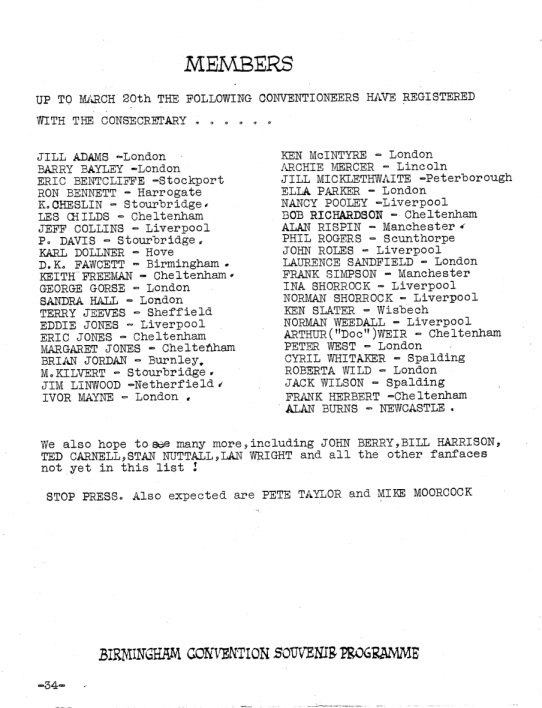
|
||
|
|